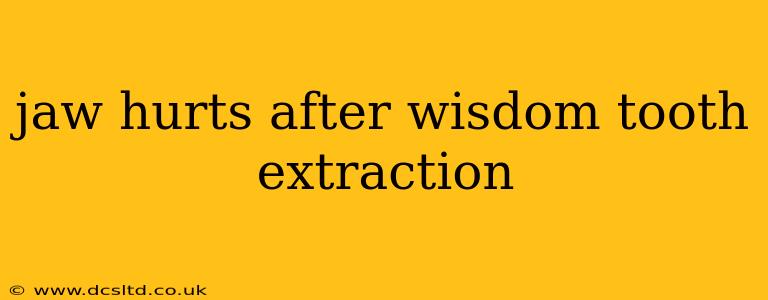Having your wisdom teeth removed is a common procedure, but the recovery process can be uncomfortable. Many patients experience jaw pain after the extraction, and understanding what's normal and when to seek professional help is crucial for a smooth recovery. This comprehensive guide will address common concerns and provide valuable insights into managing post-wisdom tooth extraction jaw pain.
Why Does My Jaw Hurt After Wisdom Tooth Extraction?
Jaw pain after wisdom tooth extraction is a completely normal side effect. The surgery involves significant manipulation of the surrounding tissues, bone, and nerves. The pain stems from several factors:
- Inflammation: Your body's natural inflammatory response to the trauma of surgery causes swelling and pain in the jaw. This is typically most intense in the first 24-48 hours.
- Nerve Irritation: The nerves in your jaw can be temporarily irritated during the extraction process, leading to pain and discomfort.
- Muscle Soreness: You may experience muscle soreness from keeping your mouth open during the procedure and from the general stress on your jaw muscles.
- Dry Socket: This painful complication occurs when the blood clot protecting the extraction site dislodges. It is characterized by intense, throbbing pain in the jaw and can require professional intervention. We'll discuss this further below.
How Long Will My Jaw Hurt?
The duration of jaw pain varies from person to person. Generally, you should expect some discomfort for at least a few days, with the most intense pain occurring during the first 24-72 hours. Most patients experience a significant reduction in pain after the first week. However, some mild soreness might linger for several weeks.
What Can I Do to Relieve Jaw Pain After Wisdom Tooth Extraction?
Managing post-extraction jaw pain involves a multi-pronged approach:
- Medication: Your dentist or oral surgeon will likely prescribe pain medication, such as ibuprofen or stronger prescription painkillers, to manage the discomfort. Follow the prescribed dosage carefully.
- Ice Packs: Applying ice packs to the affected area for 15-20 minutes at a time, several times a day, can help reduce swelling and pain. Make sure to wrap the ice pack in a thin cloth to protect your skin.
- Rest: Adequate rest is crucial for healing. Avoid strenuous activities and allow your body time to recover.
- Soft Foods: Stick to a soft food diet for the first few days. Avoid hard, crunchy, or chewy foods that could irritate the extraction site.
- Rinsing: Gently rinse your mouth with salt water several times a day to help keep the area clean and prevent infection. Avoid vigorous rinsing or using mouthwash that contains alcohol.
Is My Jaw Pain Normal After Wisdom Tooth Extraction?
While some level of jaw pain is expected, it's crucial to distinguish between normal post-operative discomfort and something more serious. Contact your dentist or oral surgeon immediately if:
- The pain is severe and doesn't respond to medication.
- You experience excessive swelling that doesn't improve after a few days.
- You notice signs of infection, such as fever, chills, or pus.
- You develop numbness or tingling in your jaw or face that persists.
- You suspect a dry socket (intense, throbbing pain, often accompanied by a bad taste or smell).
What is a Dry Socket, and How Do I Know if I Have One?
A dry socket (alveolar osteitis) is a painful complication that occurs when the blood clot that protects the extraction site becomes dislodged. This exposes the underlying bone and nerve endings, causing significant pain. Symptoms include:
- Severe, throbbing pain starting 2-5 days after extraction.
- A bad taste or odor in the mouth.
- Visible empty socket.
If you suspect a dry socket, contact your dentist or oral surgeon immediately. They can treat the condition with a medicated dressing to promote healing.
How Can I Prevent Jaw Pain After Wisdom Tooth Extraction?
While you can't completely prevent jaw pain, you can take steps to minimize your discomfort:
- Follow your dentist or oral surgeon's post-operative instructions carefully.
- Keep the area clean by gently rinsing with salt water.
- Take prescribed medication as directed.
- Avoid smoking, as it can hinder healing.
- Maintain a healthy diet to support your body's healing process.
When Should I Call My Dentist After Wisdom Tooth Extraction?
You should contact your dentist or oral surgeon if you experience any concerning symptoms, as outlined above. Don't hesitate to reach out if you have any questions or concerns during your recovery. Early intervention can prevent complications and ensure a smoother healing process. Remember, every patient's experience is unique, and prompt communication with your dental professional is key to a successful recovery.
